PREVIOUS
Geographical indications of Tamil Nadu – Part 2
(இதன் தமிழ் வடிவத்திற்கு இங்கே சொடுக்கவும்)
Geographical Indications
Recent Geographical indications of Tamil Nadu
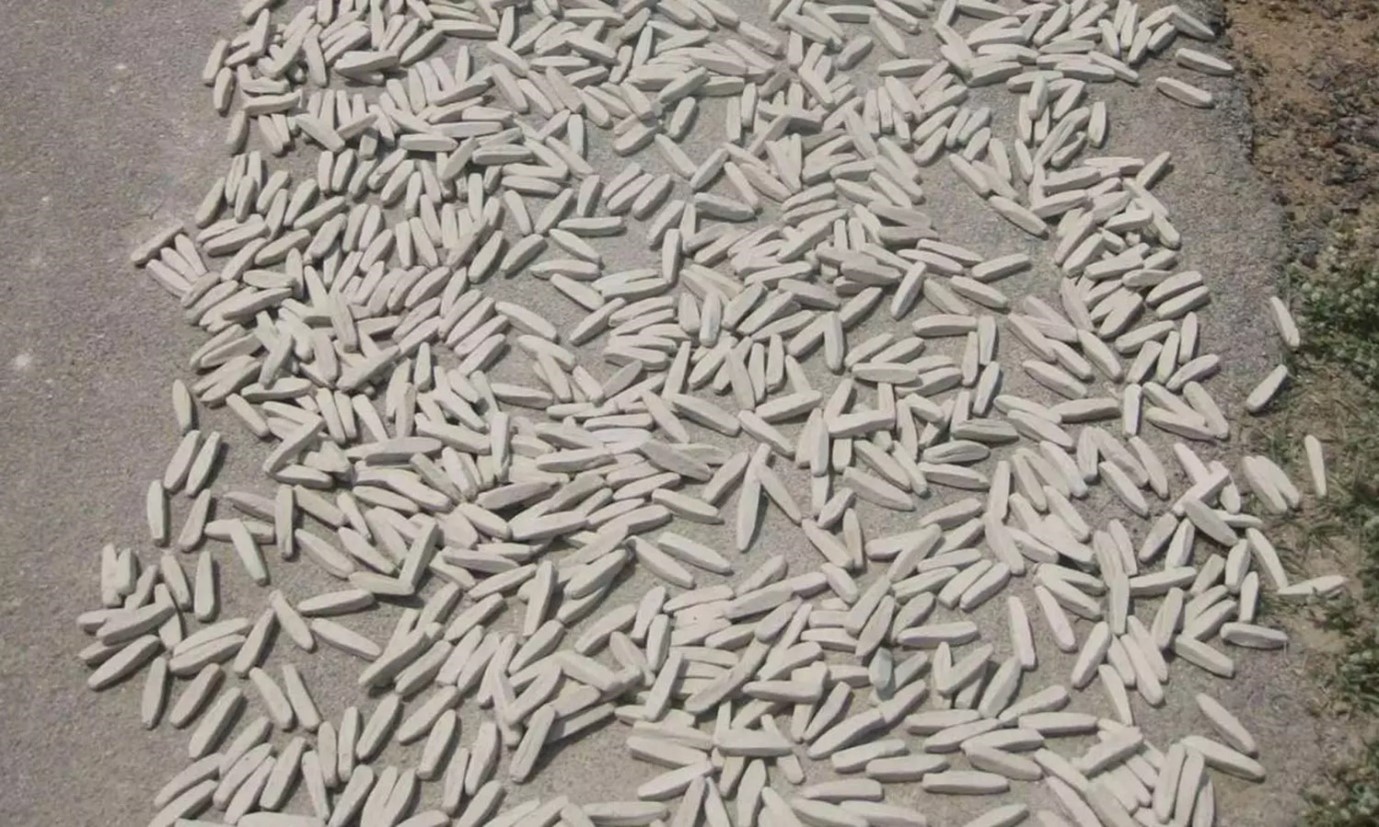
Jaderi Thiruman (Namakatti)
- The GI application for Jaderi Tiruman, filed on behalf of Jaderi Thiruman (Namakatti) Producers Society in Jaderi in Thiruvannamalai district, said one of the most visible external symbols of Hindu identity is the unique mark worn on the forehead.
- Worshippers of Lord Vishnu wear a tilak in the shape of 'U' (called Naamam).
- It is believed to protect the wearer from evil.
- The finger-length white Jaderi Tiruman made of hydrous silicate minerals has immense cultural, religious and medicinal significance.
- About 120 families in the tiny village of Jaderi in Tiruvannamalai district have been making these Namakatti for about three centuries and supplying them all over India and abroad.
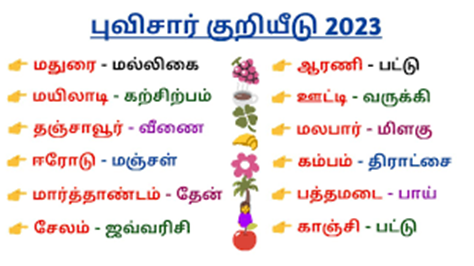
- The natural ingredients available in Thenpoondipattu village are collected and made into Namakatti by artisans after a tedious and time-consuming process.
- The skills are traditionally and hereditarily transferred from their forefathers.
- The selection of the appropriate kind of clay itself requires expertise.
- The rocks are then crushed by the traditional rollers drawn by Tow bulls (chekku maadu).
- The clay is then put through a filtering process and stored in tanks for 20 days until it turns white.
- After this, the clay paste is cut into finger-shaped Namakattis which are sun-dried for four days.
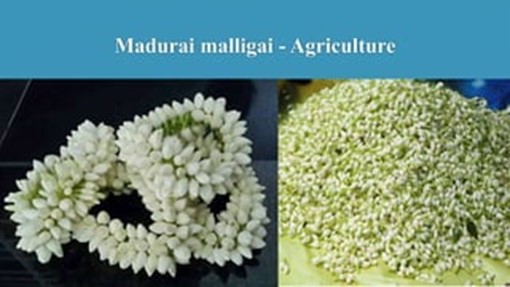
- The Namakattis are then exported to Vishnu temples across the world.
- The production of Namakattis depends on the climatic condition as it needs a lot of sunlight to dry, adding that the white tilak cools the forehead, protects the wearer and prevents energy loss.
- It is used to adorn the foreheads of idols, men, and temple elephants as well as to cure stretched skin after childbirth.
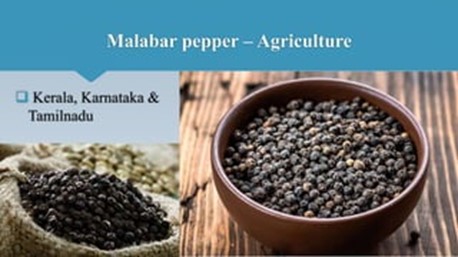
Kanyakumari Matti banana
- The GI tag has been conferred on Kanyakumari Matti Banana based on an application by Kanyakumari Banana and Horticulture Farmers Producer Company Limited.
- Matti banana (musa sapidisiaca) is a diploid cultivar commercially grown in Kanyakumari district of Tamil Nadu.
- Kanyakumari is located in the high rainfall zone with annual rainfall about 1,469 mm.
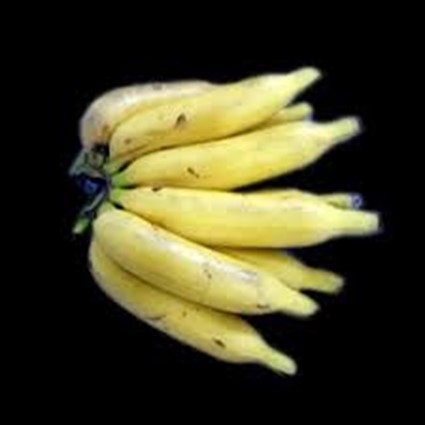
- Matti banana is mostly grown in the Agatheeswaram, Thovalai, Thiruvattar taluks.
- It is a traditional table banana cultivar having medicinal value, said Sanjai Gandhi.
- The fragrant fruit is known for its sweet and sub-acid flavor, firm texture and powdery nature.
- The 15-month crop is considered a rare variety and is grown only in the hills of South Travancore (Undivided Tamil Nadu and Kerala) near Nagercoil.
- Its bunches weigh 12 to 19 kg with 9 to 10 hands containing fairly long fingers.
- Kanyakumari Matti banana has other variants like Semmatti (red Matti), Thaen Matti (Honey Matti) and Malai Matti (Hill Matti).
- Though banana is not generally recommended to infants for up to six months.
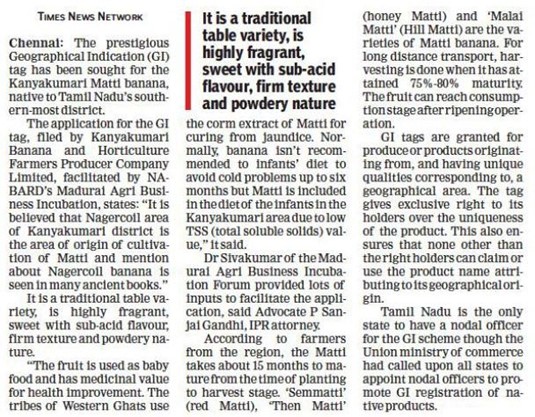
- Matti variety is included in the diet of infants in Kanyakumari area due to low TSS (Total Suspended Solids) value.
- Tribes of Western Ghats use the corm extract of Matti as cure for jaundice.
- The applicant has traced the Matti reference in several literature and government records, and also said one medium-size banana would provide approximately 13% of our daily manganese needs.
- Manganese helps our body make collagen and protects our skin and other cells against free radical damage.
- Potassium in banana helps our body maintains a healthy heart and blood pressure.
- The low sodium and high potassium combination help to control high blood pressure.
- Bananas are also rich in vitamin C that protects our body against cell and tissue damage.
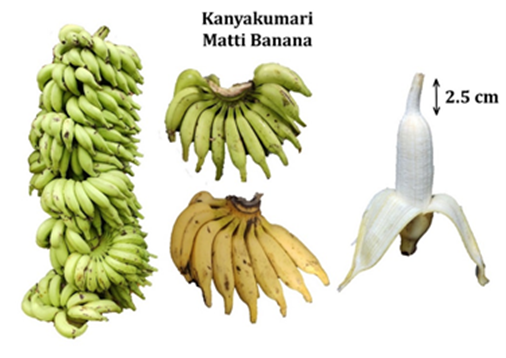
Chedibutta Sarees
- Application for the third GI tag-winner, Chedibutta Sarees, has been made by Veeravanallur Sowrashtra Weavers Cooperative Production and Sales Society Limited in Tirunelveli district.
- The name Chedibutta is a combination of two Tamil words -- ‘Chedi’ (plant) and ‘Butta’ (motif or design).
- Chedibutta saree has the iconic "plant and flower" motif woven on the border and Pallu (edge of the saree), and these small Buttas punctuated beautifully all over the saree.
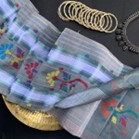
- This flower plant design or the Chedibutta design is the intrinsic characteristic of this saree.
- It is totally a handloom product made in in art silk and cotton mix fabric.
- One Chedibutta saree contains eight Chedibutta designs in the body and 5 on the Pallu.
- The saree is woven using art silk thread while the Chedibutta designs are made using brightly colored cotton threads.
- The entirely manual process involves preparation of cotton yarn using a Charkha and the preparation of the warp beam to the complete weaving process of the saree.
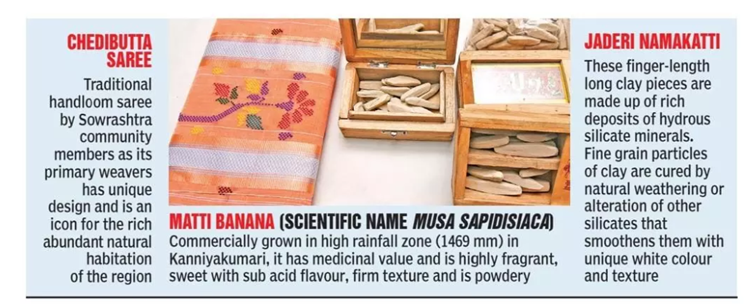
- The weavers do not use a power loom or a peddle loom.
- The Chedibutta design is not made by Jacquard machines either.
- Multiple cotton colour yarns are used to make each design and there are colour variations from design to design within a single Saree.
- The weavers use pirns to wind the weft yarn during the pirn-winding process and shuttles are used as carriers of yarn during weaving.
- The Chedibutta saree has a soft texture which is suitable for the tropical climate.
- It is comfortable in summer and warm during the winter.
- Due to the nature of the raw materials used, these sarees do not wrinkle easily and are easy to maintain.
- They weigh light too.

- Details of Geographical Indications in Tamil Nadu from 2004-2023
|
Geographical Indications |
Goods (As per the GI Act 1999) |
|
|
1 |
Salem Fabric |
Handicraft |
|
2 |
Kancheepuram Silk |
Handicraft |
|
3 |
Bhavani Jamakkalam |
Handicraft |
|
4 |
Madurai Sungudi |
Handicraft |
|
5 |
Coimbatore wet Grinder |
Manufactured |
|
6 |
Thanjavur Paintings |
Handicraft |
|
7 |
Temple Jewellery of Nagercoil |
Handicraft |
|
8 |
Thanjavur Art Plate |
Handicraft |
|
9 |
Malabar Pepper (Share with Karnataka and Kerala) |
Agricultural |
|
10 |
Alleppey Green Cardamom (Share with Kerala) |
Agricultural |
|
11 |
East India Leather |
Manufactured |
|
12 |
Salem Silk known as Salem Venpattu |
Handicraft |
|
13 |
Kovai Kora Cotton Sarees |
Handicraft |
|
14 |
Arani Silk |
Handicraft |
|
15 |
Swamimalai Bronze Icons |
Handicraft |
|
16 |
Eathomozhy Tall Coconut |
Agricultural |
|
17 |
Thanjavur Doll |
Handicraft |
|
18 |
Nilgiri (Orthodox) |
Agricultural |
|
19 |
Virupakshi Hill Banana |
Agricultural |
|
20 |
Sirumalai Hill Banana |
Agricultural |
|
21 |
Madurai Malli |
Agricultural |
|
22 |
Pattamadai Pai ("Pattamadai Mat'') |
Handicraft |
|
23 |
Nachiarkoil Kuthuvilakku Nachiarkoil Lamp |
Handicraft |
|
24 |
Chettinad Kottan |
Handicraft |
|
25 |
Toda Embroidery |
Handicraft |
|
26 |
Thanjavur Veenai |
Handicraft |
|
27 |
Thanjavur Art Plate (Logo) |
Handicrafts |
|
28 |
Swamimalai Bronze Icons (Logo) |
Handicrafts |
|
29 |
Temple Jewellery of Nagercoil (Logo) |
Handicrafts |
|
30 |
Mahabalipuram Stone Sculpture |
Handicrafts |
|
31 |
Erode Manjal (Erode Turmeric) |
Agricultural |
|
32 |
Thirubuvanam Silk Sarees |
Handicraft |
|
33 |
Kodaikanal Malai Poondu |
Agricultural |
|
34 |
Palani Panchamirtham |
Food Stuff |
|
35 |
Dindigul Locks |
Handicraft |
|
36 |
Kandangi Saree |
Handicraft |
|
37 |
Srivilliputtur Palkova |
Food Stuff |
|
38 |
Kovilpatti Kadalai Mittai |
Food Stuff |
|
39 |
Thanjavur Netti Works |
Handicraft |
|
40 |
Arumbavur Wood Carvings |
Handicraft |
|
41 |
Karuppur Kalamkari Paintings |
Handicraft |
|
42 |
Kallakurichi Wood Carving |
Handicraft |
|
43 |
Kanniyakumari Clove |
Agricultural |
|
44 |
Narasinghapettai Nagaswaram |
Handicraft |
|
45 |
Ramnathapuram Mundu Chilli |
Agricultural |
|
46 |
Vellore Spiny Brinjal |
Agricultural |
|
47 |
Myladi Stone Carvings |
Handicraft |
|
48 |
Manapparai Murukku |
Food Stuff |
|
49 |
Ooty Varkey |
Food Stuff |
|
50 |
Manamadurai Pottery |
Handicraft |
|
51 |
Thaikkal Rattan Craft |
Handicraft |
|
52 |
Salem Sago (Javvarisi) |
Food Stuff |
|
53 |
Authoor Vetrilai |
Agricultural |
|
54 |
Cumbum Panneer Thratchai |
Agricultural |
|
55 |
Negamam Cotton Saree |
Handicraft |
|
56 |
Sholavandan Vetrilai |
Agricultural |
|
57 |
Marthandam Honey |
Natural |
|
58 |
Jaderi Namakatti |
Handicraft |
|
59 |
Kanyakumari Matti Banana |
Agricultural |
|
60 |
Chedibutta Saree |
Handicraft |
- The state has decided to get GI tags for another 15 products.
- In the new move, Arasampatti Thennai (coconut tree), Aandarkulam Kaththiri (eggplant), Karuppugauni arisi (black brown rice), Krishnagiri panneer roja (panneer rose), Kottimulai kaththiri (eggplant), Sathur Vellari (cucumber), Sengal thuvarai (thur dal), Vilathikulam Milagai (chilli), Javvadhumalai saamai (type of lentil), Veeramangudi achuvellam (raw jaggery), Virudhunagar adhalaikkaai (type of vegetable), Moolanur Murungai (drumstick), Madurai Sengarumbu (red cane), Peravoorani Thennai (coconut tree) and Tindivanam panippayaru (type of lentil) are to get GI tags in the future.
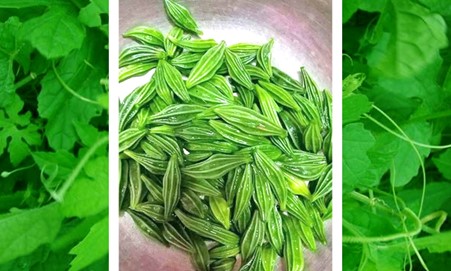
Virudhunagar adhalaikkaai (type of vegetable)
-------------------------------------


